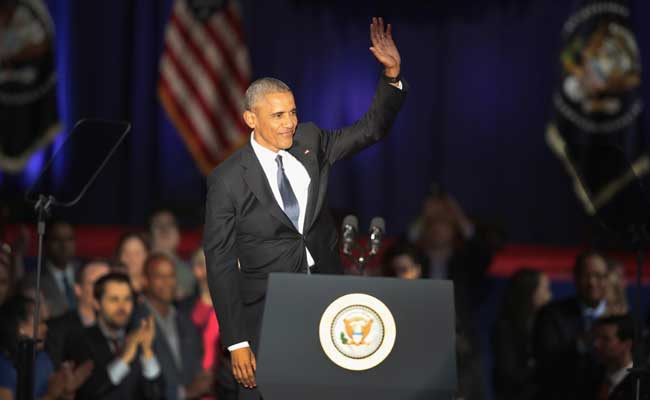Democracy Needs You: Obama's Farewell Speech

NEW DELHI: United States President Barack Obama called on Americans to defend their democracy in a farewell speech in Chicago today.
Obama will be succeeded by republican candidate Donald Trump, who emerged victorious following one of the most bitterly contested elections in recent history. In the weeks since, Trump has vowed to undo some of Obama’s signature policies after he takes over on January 20.
As the crowd chanted “four more years” -- which Obama brushed aside with a “I can’t do that” -- the outgoing President spoke about American democracy, highlighting three visible threats, namely, economic inequality, racial divisions and the retreat of different segments of society into "bubbles.”
“It’s the conviction that we are all created equal, endowed by our creator with certain unalienable rights, among them life, liberty, and the pursuit of happiness. It’s the insistence that these rights, while self-evident, have never been self-executing; that We, the People, through the instrument of our democracy, can form a more perfect union,” Obama said.
“Our youth, our drive, our diversity and openness, our boundless capacity for risk and reinvention means that the future should be ours. But that potential will only be realized if our democracy works. Only if our politics better reflects the decency of our people. Only if all of us, regardless of party affiliation or particular interests help restore the sense of common purpose that we so badly need right now,” he said.
“There have been moments throughout our history that threatened that solidarity. And the beginning of this century has been one of those times. A shrinking world, growing inequality, demographic change, and the specter of terrorism. These forces haven’t just tested our security and our prosperity, but are testing our democracy as well. And how we meet these challenges to our democracy will determine our ability to educate our kids and create good jobs and protect our homeland. In other words, it will determine our future. To begin with, our democracy won’t work without a sense that everyone has economic opportunity.”
“But laws alone won’t be enough. Hearts must change. It won’t change overnight. Social attitudes oftentimes take generations to change. But if our democracy is to work the way it should in this increasingly diverse nation, then each one of us need to try to heed the advice of a great character in American fiction, Atticus Finch, who said “You never really understand a person until you consider things from his point of view, until you climb into his skin and walk around in it,” Obama continued. “For blacks and other minority groups, that means tying our own very real struggles for justice to the challenges that a lot of people in this country face. Not only the refugee or the immigrant or the rural poor or the transgender American, but also the middle-aged white guy who from the outside may seem like he’s got all the advantages, but has seen his world upended by economic, and cultural, and technological change.”
“For too many of us it’s become safer to retreat into our own bubbles, whether in our neighborhoods, or on college campuses, or places of worship, or especially our social media feeds, surrounded by people who look like us and share the same political outlook and never challenge our assumptions. In the rise of naked partisanship and increasing economic and regional stratification, the splintering of our media into a channel for every taste, all this makes this great sorting seem natural, even inevitable. And increasingly we become so secure in our bubbles that we start accepting only information, whether it’s true or not, that fits our opinions, instead of basing our opinions on the evidence that is out there.”
“But, protecting our way of life, that’s not just the job of our military. Democracy can buckle when it gives into fear. So just as we as citizens must remain vigilant against external aggression, we must guard against a weakening of the values that make us who we are.”
“America, we weaken those ties when we allow our political dialogue to become so corrosive that people of good character aren’t even willing to enter into public service. So course with rancor that Americans with whom we disagree are seen, not just as misguided, but as malevolent. We weaken those ties when we define some of us as more American than others.”
“I am asking you to believe. Not in my ability to bring about change — but in yours.”



